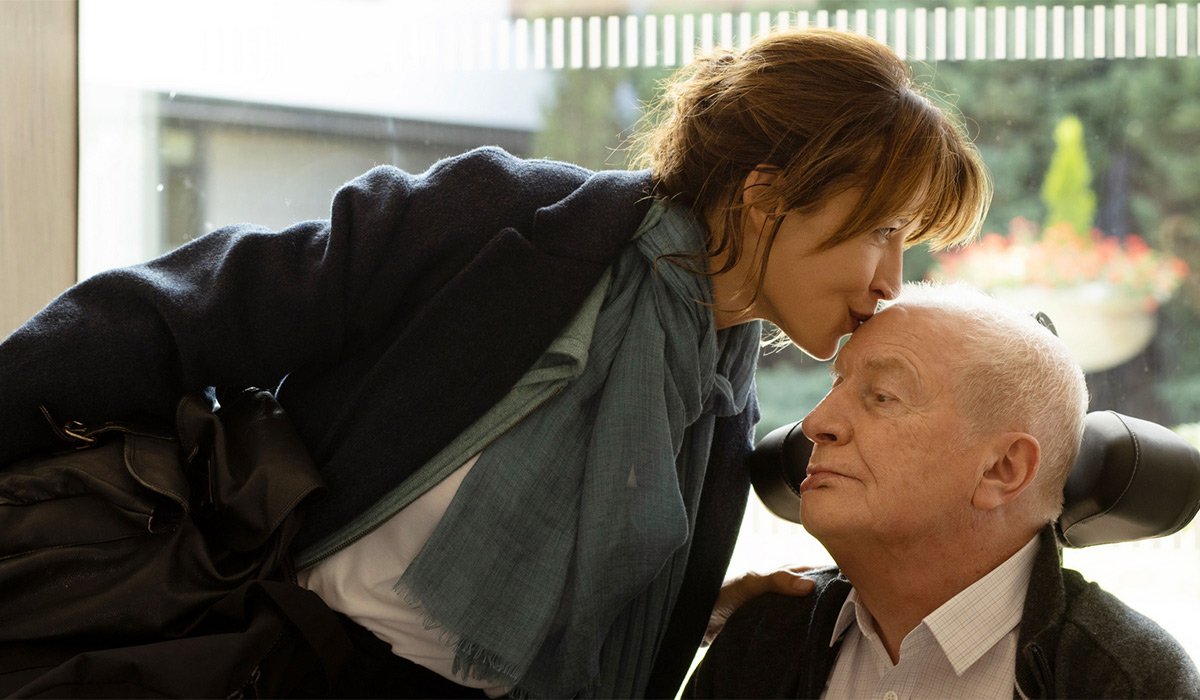


At the heart of the father-daughter conflict in Everything Went Fine (Tout s’est bien passé) is a provocative jest: André (André Dussollier) teases feminine, heterosexual Emmanuèle (Sophie Marceau), saying, “You’re my favorite son.” They have had no secrets since divorce separated the family of bourgeois artistes with two daughters. But when the 84-year-old father suffers a stroke, his eldest, nicknamed “Manue,” feels her obedience change — she’s pulled into rocky yet steadfast obligation. Everything Went Fine is a near-great film examining our responses to the emotional complexities that occur in family life.
Director François Ozon plants a second-act surprise that a lesser filmmaker would emphasize as the film’s topical issue: sexual affinity. Manue, a childless wife, relates more to the persnickety, temperamental bad father than to her angry, aloof mother (Charlotte Rampling), while the other sibling Pascale (Géraldine Pailhas), herself a mother, stands by as an ally. Despite these overlapping sensibilities, it is their differences that draw father and daughter closer the moment André asks Manue to assist his suicide. Asked whether her father’s demands indicate love or perversity, Manue answers “both.”
This is Ozon’s most emotionally probing film since Frantz, a remake of Ernst Lubitch’s The Man I Killed (Broken Lullaby), but he also made the extraordinary By the Grace of God, Ricky, and Young and Beautiful, specializing in odd relationships. This time, Ozon’s unexpected affinities are based on a memoir by Emmanuèle Bernheim (the real-life writer Marceau portrays). Bernheim also collaborated on Ricky. Here, Ozon flips the parthenogenesis jest in Ricky to observe parenthood and mortality from the perspective of a grown-up child.
The Bernheims are well-off Jewish Parisians, living in the first arrondissement, unperturbed by religious strictures. Ozon tracks their secular sophistication, yet they still face moral questions and burdens. That might sound like cold, Kubrickian irony, but Ozon always moves past transgressive clichés. His warm aesthetic sensibility (photographed by Hichame Alaouie) embraces André’s intractable intelligence and Manue’s distinct, varying emotions. They discuss “traces of man in nature,” then a Swiss matron appears between them both — Hanna Schygulla playing a representative from Dignitas, a euthanasia group stressing self-determination and autonomy.
Schygulla calmly insists, “We’re assisting his suicide, but we’re not the ones killing him. Is that right?” and Ozon pans up to a painting of mountains and lakes. This unusual instance of supernatural symbolism only works because Schygulla (a Rainer Werner Fassbinder icon) conveys a strangely pacifying presence. Her wide face moves from passivity to weird tranquility; she shows a tenderness that Fassbinder missed. That Manue cannot help having an immediate response to this angelic mother figure humanizes Ozon’s scheme. (It’s also a reminder of the awesome Ricky.)
Ozon’s experimentation with multiple genres and experiences helps Everything Went Fine transcend its own concept — as well as the prestige-movie conceit of last year’s excellent Peaceful. He directs Dussollier (a star from Resnais, Rivette, and Rohmer territory) and Marceau (a Bond girl and star of Braveheart) to original, memorable characterizations. Dussolier, wheezing with a twisted lower lip, does wily, gay insouciance that surpasses Christopher Plummer’s sentimentalized gay geezer in Beginners, and Marceau suggests a Jennifer Aniston–type with depth. Their mutual acceptance is as fraught as Henry James’s The Golden Bowl, yet Ozon inserts humorous emotional changes — from shared epithets to a randy tease about André’s old flames and Manue’s horror-film distraction. These candid intimacies (André’s homosexuality is a family revelation, not a political virtue) connect Ozon’s sympathetic insight to his film-savvy virtuosity.
And there’s an unexpected bonus: We instinctively react to this film’s assisted-suicide subject by recalling Jean-Luc Godard’s death. Even though the film was made two years earlier, Ozon’s account of unfathomable family personalities helps us deal with the difficult, heartbreaking, ultimately human choices of the great genius who has passed. Ozon’s honesty does honor to Godard’s legacy of moral rigor and profound art.
